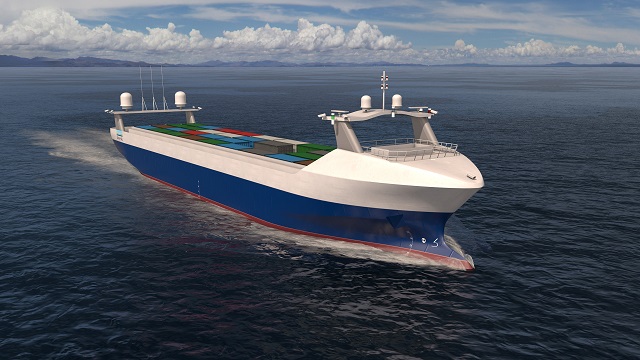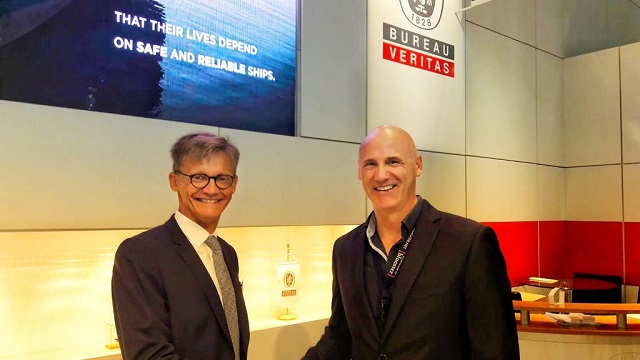Class Gets SMMart
Class societies have delivered on this year’s SMM motto “Trends in SMMart Shipping.” As leading innovators from the 2,289 exhibitors from 69 countries present at SMM this year, they have announced a diverse range of new technology developments and applications:
DNV GL releases autonomous and remotely operated ship guideline

DNV GL has released a new class guideline covering autonomous and remotely operated ships. The guideline covers new operational concepts that do not fit within existing regulations and technologies that control functions that would normally be performed by humans. They include navigation, vessel engineering, remote control centers and communications.
Particular emphasis is given in two key areas that emerge from the reliance of autonomous and remote concepts on software and communications systems: cyber-security and software testing. Both the concept qualification process and the technology qualification process include cyber security aspects in the risk analysis. Not only the systems themselves, but the associated infrastructure and network components, servers, operator stations and other endpoints should all take cyber security into account, incorporating multiple layers of defense where possible, says DNV GL. Additionally, quality assurance of software-based systems is essential, and well established development processes and a multifaceted end-product testing strategy should be used to ensure safe operation.
First class approval program for additive manufacturing manufacturers

DNV GL has also released the first approval of manufacturer scheme for additive manufacturing producers wishing to supply products that comply with the DNV GL rules and standards. Additive manufacturing is a term that covers industrial processes that create three dimensional objects by adding layers of material: It includes such technologies as 3D printing, rapid prototyping, direct digital manufacturing, layered manufacturing and additive fabrication.
The approval program is designed to verify a manufacturers’ ability to consistently manufacture materials and products to given specifications and in accordance with the DNV GL rule requirements. As part of applying for approval, manufacturers must firstly undertake a proof of concept to demonstrate that they have feasible technology and products.
ABS publishes comprehensive additive manufacturing guidance

ABS has published the ABS Guidance Notes on Additive Manufacturing, establishing a consistent approach to three-dimensional printing of marine and offshore materials and equipment.
Additive manufacturing has the potential to shrink the supply chain and lead times for specialized and complex parts, introducing new efficiencies across the industry, says ABS, but critical for those considering additive manufacturing techniques is a consistent process that results in a final product with the desired properties and qualities. The qualification process accommodates flexible fabrication enabling a single additive manufacturing system to produce a wide range of parts, while maintaining repeatable results and allowing for regular evaluation.
The ABS Guidance Notes define a procedure for qualifying additive manufactured parts, as well as the processes and systems used to create them, including directed energy deposition, powder bed fusion and binder jetting.
LR announces the launch of prototype blockchain-enabled Class register
Lloyd's Register (LR) has created the first demonstrator that can register ships into Class using blockchain technology.
LR created the first register of ships in 1764, a tool used to provide merchants and underwriters information about the quality and condition of vessels they chartered and insured. Today, LR is re-imagining the Class register for the digital age having successfully applied blockchain technology to the classification process of registering new ships into Class and launching a prototype blockchain-enabled register tool in collaboration with Applied Blockchain.
Bureau Veritas and [bluester] co-operate in online marketplace for maritime services

Bureau Veritas is integrating its digital platforms with the [bluester] online marketplace and providing independent vendor qualification services to [bluester] users.
The [bluester] marketplace covers the full range of maritime procurement requirements. It enables buyers and suppliers to settle through a common interface using a set of streamlined processes. Ship managers and service providers automatically, impartially and transparently match against their own predefined criteria for direct contract conclusion on the platform.

that matters most
Get the latest maritime news delivered to your inbox daily.
Desktop and global online verification of [bluester] listed service providers by Bureau Veritas will add to the safety, reliability and efficiency of direct contracting through [bluester] as service providers’ qualifications and documentation will benefit from impartial validation.
Deep integration of the [bluester] platform into Bureau Veritas’ own digital tools VeriSTAR Info, My VeriSTAR, BV Approval Explorer and PSC Ready provides added value, says Bureau Veritas. The class society's customers will have access to the [bluester] marketplace via a single sign on and receive special user benefits.
